Dementia: Causes, Diagnosis, and Treatment
VerifiedAdded on 2023/01/06
|12
|3757
|78
AI Summary
This report provides an in-depth analysis of dementia, including its causes, signs and symptoms, diagnosis, and treatment options. It discusses the increase in dementia cases and compares and contrasts different diagnostic methods. The report also explores the available treatment and support for individuals with dementia at different stages. Additionally, it highlights the support available for families dealing with end-stage dementia.
Contribute Materials
Your contribution can guide someone’s learning journey. Share your
documents today.
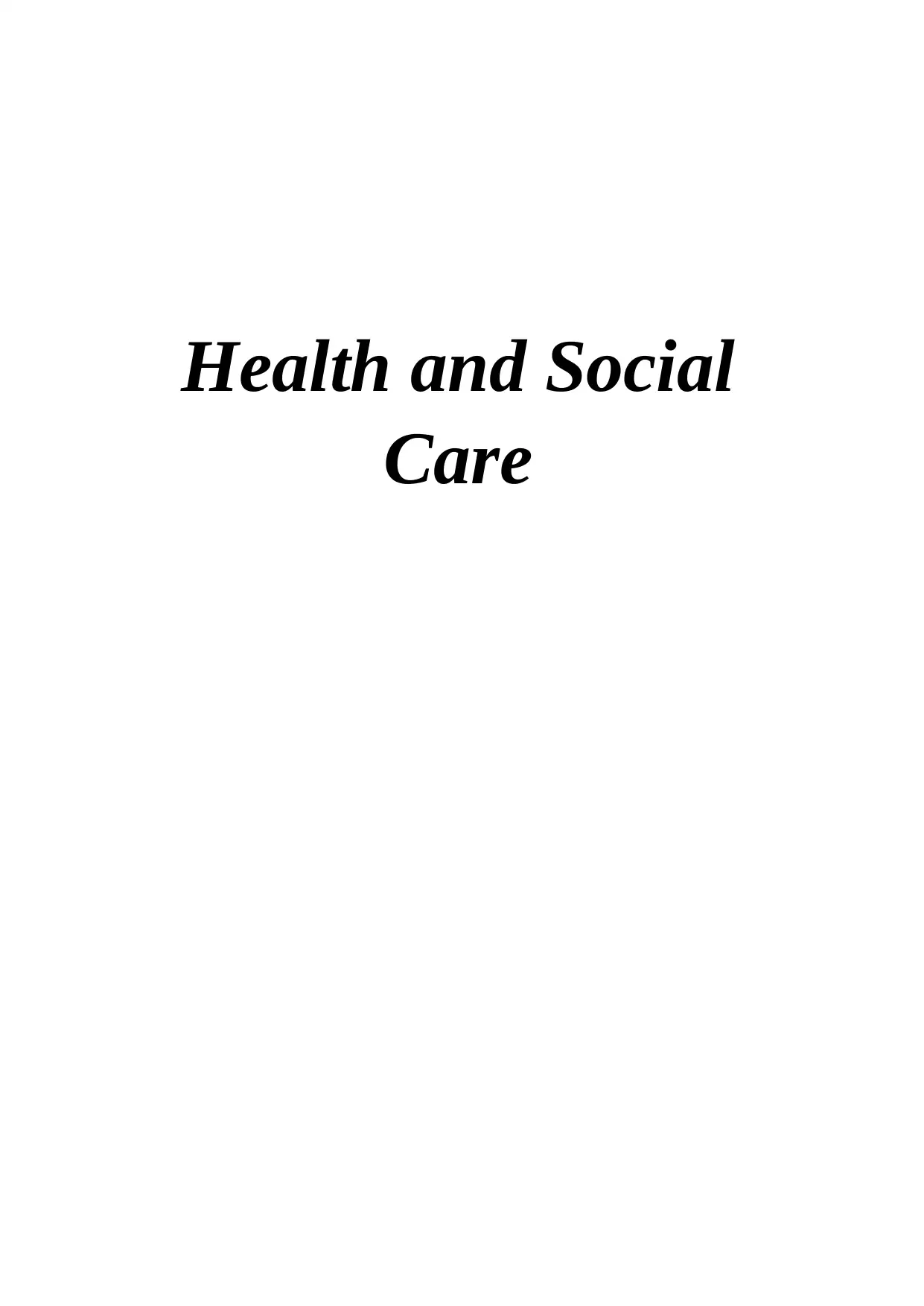
Health and Social
Care
Care
Secure Best Marks with AI Grader
Need help grading? Try our AI Grader for instant feedback on your assignments.
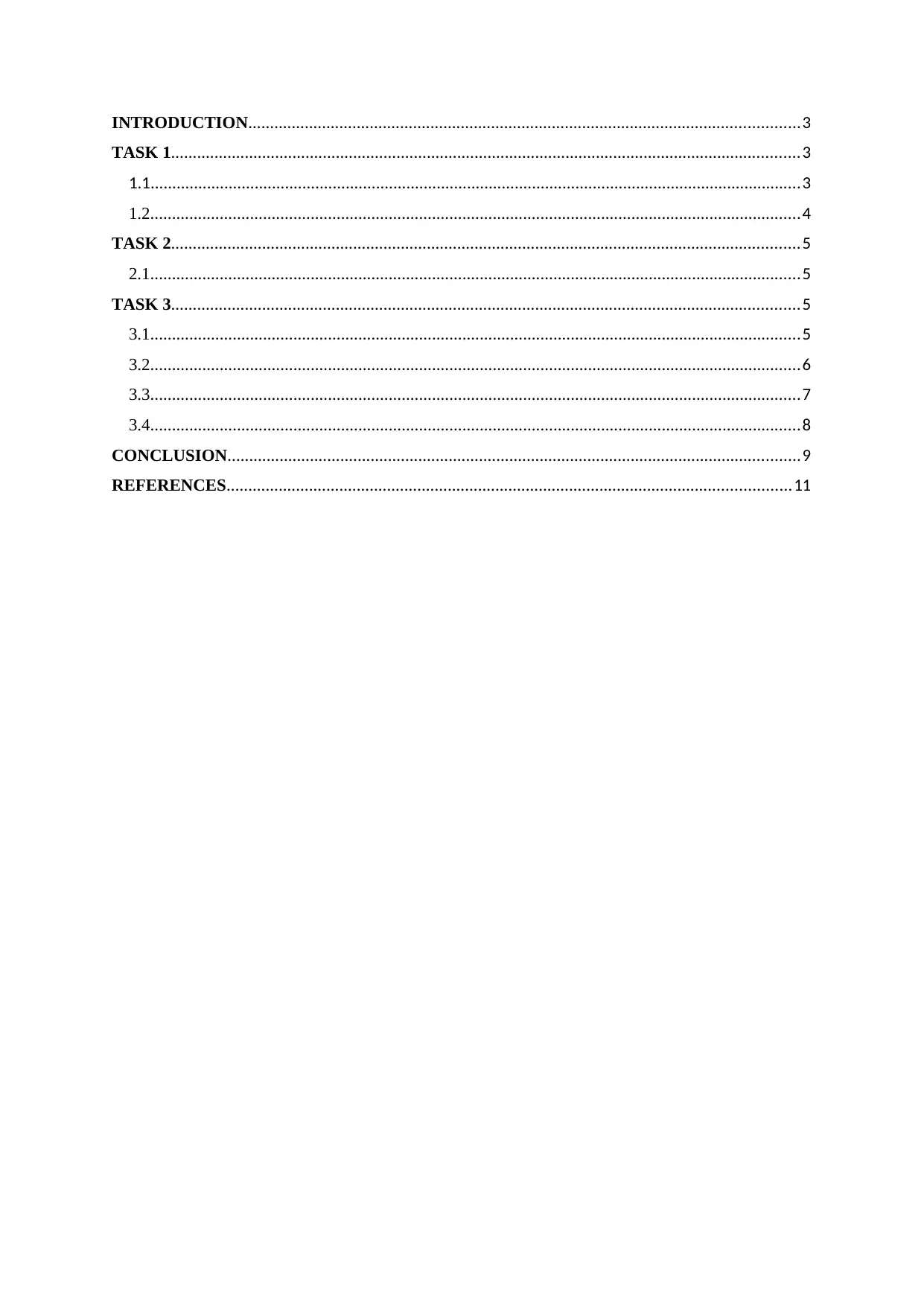
INTRODUCTION...............................................................................................................................3
TASK 1.................................................................................................................................................3
1.1......................................................................................................................................................3
1.2......................................................................................................................................................4
TASK 2.................................................................................................................................................5
2.1......................................................................................................................................................5
TASK 3.................................................................................................................................................5
3.1......................................................................................................................................................5
3.2......................................................................................................................................................6
3.3......................................................................................................................................................7
3.4......................................................................................................................................................8
CONCLUSION....................................................................................................................................9
REFERENCES..................................................................................................................................11
TASK 1.................................................................................................................................................3
1.1......................................................................................................................................................3
1.2......................................................................................................................................................4
TASK 2.................................................................................................................................................5
2.1......................................................................................................................................................5
TASK 3.................................................................................................................................................5
3.1......................................................................................................................................................5
3.2......................................................................................................................................................6
3.3......................................................................................................................................................7
3.4......................................................................................................................................................8
CONCLUSION....................................................................................................................................9
REFERENCES..................................................................................................................................11
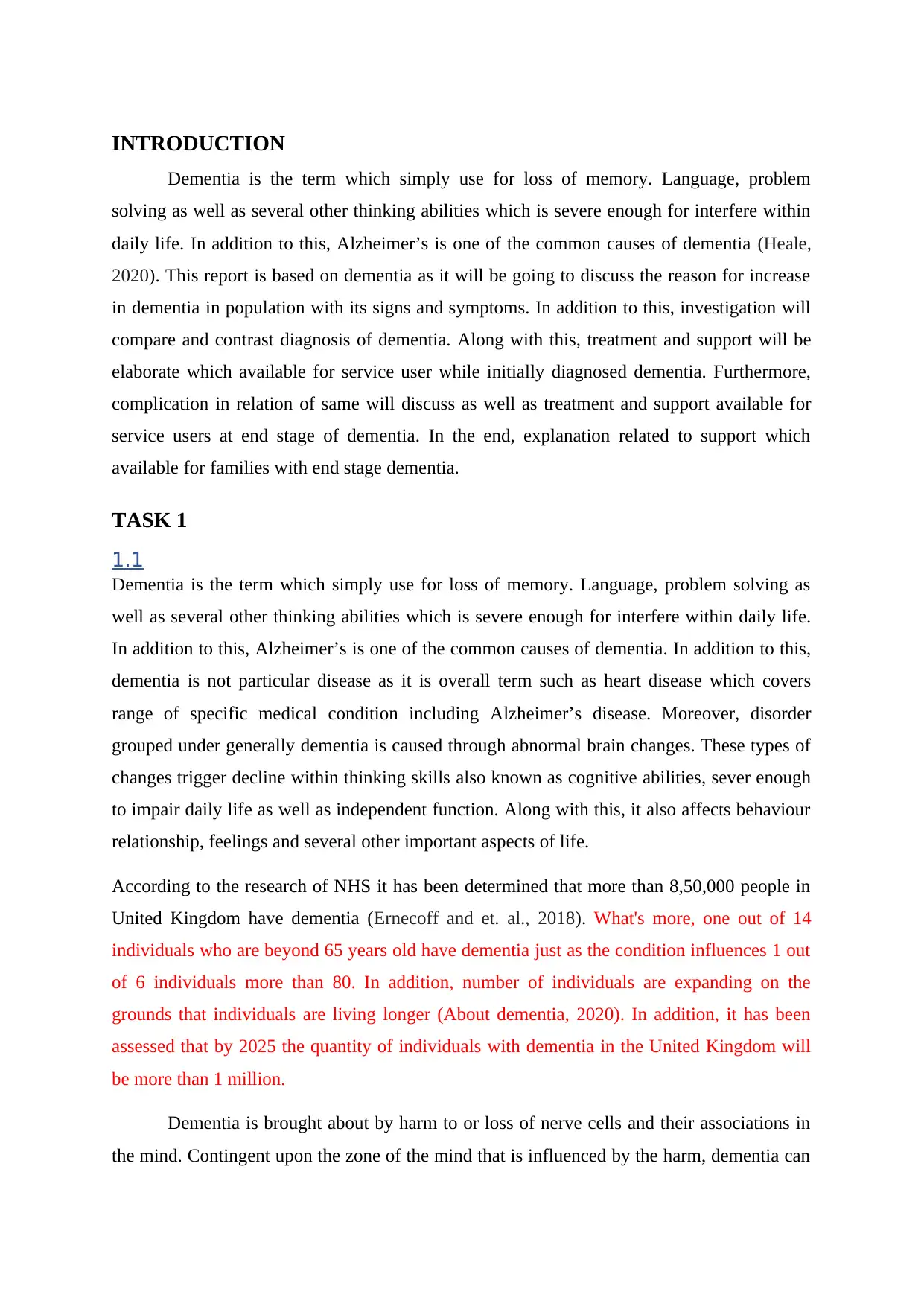
INTRODUCTION
Dementia is the term which simply use for loss of memory. Language, problem
solving as well as several other thinking abilities which is severe enough for interfere within
daily life. In addition to this, Alzheimer’s is one of the common causes of dementia (Heale,
2020). This report is based on dementia as it will be going to discuss the reason for increase
in dementia in population with its signs and symptoms. In addition to this, investigation will
compare and contrast diagnosis of dementia. Along with this, treatment and support will be
elaborate which available for service user while initially diagnosed dementia. Furthermore,
complication in relation of same will discuss as well as treatment and support available for
service users at end stage of dementia. In the end, explanation related to support which
available for families with end stage dementia.
TASK 1
1.1
Dementia is the term which simply use for loss of memory. Language, problem solving as
well as several other thinking abilities which is severe enough for interfere within daily life.
In addition to this, Alzheimer’s is one of the common causes of dementia. In addition to this,
dementia is not particular disease as it is overall term such as heart disease which covers
range of specific medical condition including Alzheimer’s disease. Moreover, disorder
grouped under generally dementia is caused through abnormal brain changes. These types of
changes trigger decline within thinking skills also known as cognitive abilities, sever enough
to impair daily life as well as independent function. Along with this, it also affects behaviour
relationship, feelings and several other important aspects of life.
According to the research of NHS it has been determined that more than 8,50,000 people in
United Kingdom have dementia (Ernecoff and et. al., 2018). What's more, one out of 14
individuals who are beyond 65 years old have dementia just as the condition influences 1 out
of 6 individuals more than 80. In addition, number of individuals are expanding on the
grounds that individuals are living longer (About dementia, 2020). In addition, it has been
assessed that by 2025 the quantity of individuals with dementia in the United Kingdom will
be more than 1 million.
Dementia is brought about by harm to or loss of nerve cells and their associations in
the mind. Contingent upon the zone of the mind that is influenced by the harm, dementia can
Dementia is the term which simply use for loss of memory. Language, problem
solving as well as several other thinking abilities which is severe enough for interfere within
daily life. In addition to this, Alzheimer’s is one of the common causes of dementia (Heale,
2020). This report is based on dementia as it will be going to discuss the reason for increase
in dementia in population with its signs and symptoms. In addition to this, investigation will
compare and contrast diagnosis of dementia. Along with this, treatment and support will be
elaborate which available for service user while initially diagnosed dementia. Furthermore,
complication in relation of same will discuss as well as treatment and support available for
service users at end stage of dementia. In the end, explanation related to support which
available for families with end stage dementia.
TASK 1
1.1
Dementia is the term which simply use for loss of memory. Language, problem solving as
well as several other thinking abilities which is severe enough for interfere within daily life.
In addition to this, Alzheimer’s is one of the common causes of dementia. In addition to this,
dementia is not particular disease as it is overall term such as heart disease which covers
range of specific medical condition including Alzheimer’s disease. Moreover, disorder
grouped under generally dementia is caused through abnormal brain changes. These types of
changes trigger decline within thinking skills also known as cognitive abilities, sever enough
to impair daily life as well as independent function. Along with this, it also affects behaviour
relationship, feelings and several other important aspects of life.
According to the research of NHS it has been determined that more than 8,50,000 people in
United Kingdom have dementia (Ernecoff and et. al., 2018). What's more, one out of 14
individuals who are beyond 65 years old have dementia just as the condition influences 1 out
of 6 individuals more than 80. In addition, number of individuals are expanding on the
grounds that individuals are living longer (About dementia, 2020). In addition, it has been
assessed that by 2025 the quantity of individuals with dementia in the United Kingdom will
be more than 1 million.
Dementia is brought about by harm to or loss of nerve cells and their associations in
the mind. Contingent upon the zone of the mind that is influenced by the harm, dementia can
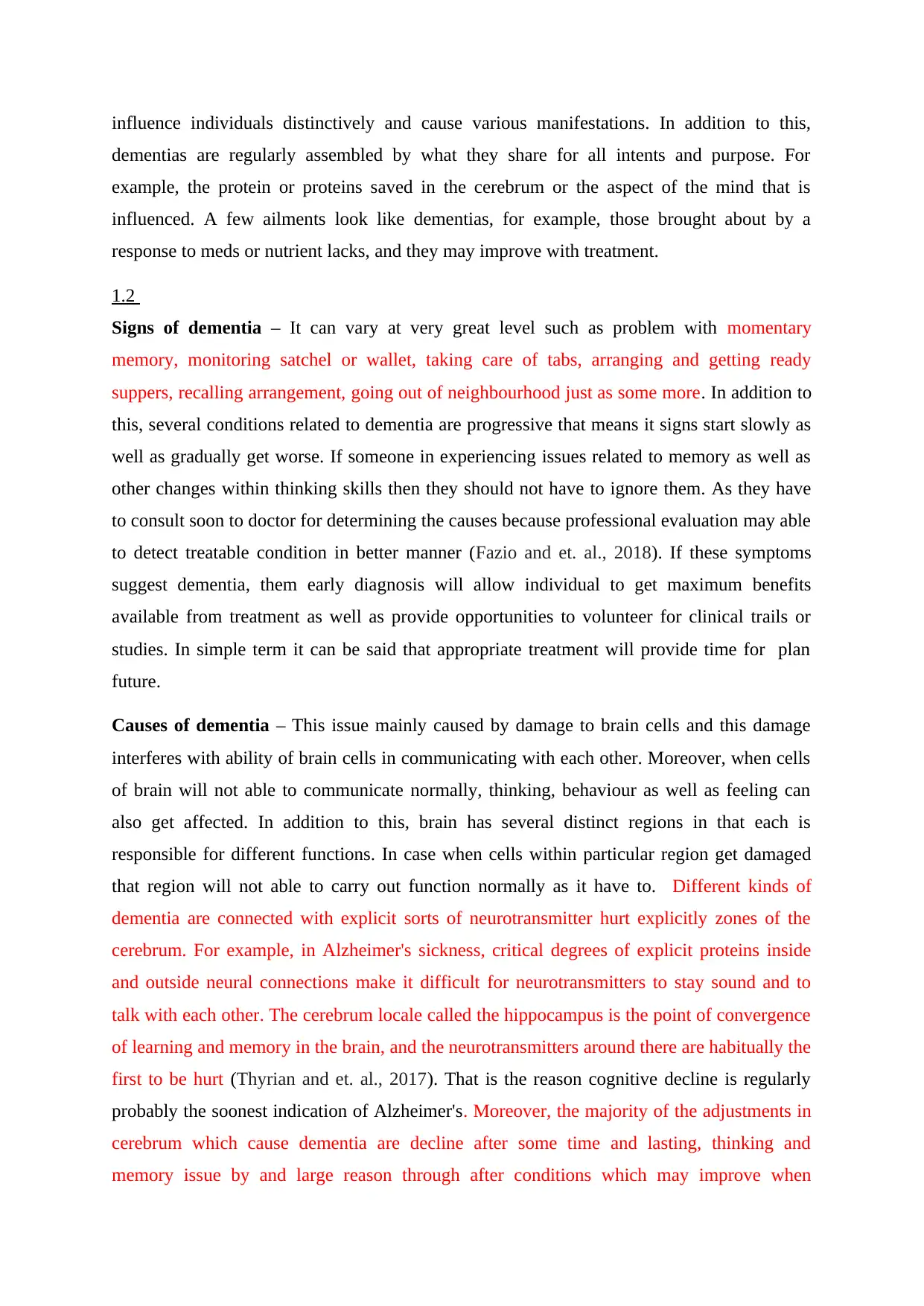
influence individuals distinctively and cause various manifestations. In addition to this,
dementias are regularly assembled by what they share for all intents and purpose. For
example, the protein or proteins saved in the cerebrum or the aspect of the mind that is
influenced. A few ailments look like dementias, for example, those brought about by a
response to meds or nutrient lacks, and they may improve with treatment.
1.2
Signs of dementia – It can vary at very great level such as problem with momentary
memory, monitoring satchel or wallet, taking care of tabs, arranging and getting ready
suppers, recalling arrangement, going out of neighbourhood just as some more. In addition to
this, several conditions related to dementia are progressive that means it signs start slowly as
well as gradually get worse. If someone in experiencing issues related to memory as well as
other changes within thinking skills then they should not have to ignore them. As they have
to consult soon to doctor for determining the causes because professional evaluation may able
to detect treatable condition in better manner (Fazio and et. al., 2018). If these symptoms
suggest dementia, them early diagnosis will allow individual to get maximum benefits
available from treatment as well as provide opportunities to volunteer for clinical trails or
studies. In simple term it can be said that appropriate treatment will provide time for plan
future.
Causes of dementia – This issue mainly caused by damage to brain cells and this damage
interferes with ability of brain cells in communicating with each other. Moreover, when cells
of brain will not able to communicate normally, thinking, behaviour as well as feeling can
also get affected. In addition to this, brain has several distinct regions in that each is
responsible for different functions. In case when cells within particular region get damaged
that region will not able to carry out function normally as it have to. Different kinds of
dementia are connected with explicit sorts of neurotransmitter hurt explicitly zones of the
cerebrum. For example, in Alzheimer's sickness, critical degrees of explicit proteins inside
and outside neural connections make it difficult for neurotransmitters to stay sound and to
talk with each other. The cerebrum locale called the hippocampus is the point of convergence
of learning and memory in the brain, and the neurotransmitters around there are habitually the
first to be hurt (Thyrian and et. al., 2017). That is the reason cognitive decline is regularly
probably the soonest indication of Alzheimer's. Moreover, the majority of the adjustments in
cerebrum which cause dementia are decline after some time and lasting, thinking and
memory issue by and large reason through after conditions which may improve when
dementias are regularly assembled by what they share for all intents and purpose. For
example, the protein or proteins saved in the cerebrum or the aspect of the mind that is
influenced. A few ailments look like dementias, for example, those brought about by a
response to meds or nutrient lacks, and they may improve with treatment.
1.2
Signs of dementia – It can vary at very great level such as problem with momentary
memory, monitoring satchel or wallet, taking care of tabs, arranging and getting ready
suppers, recalling arrangement, going out of neighbourhood just as some more. In addition to
this, several conditions related to dementia are progressive that means it signs start slowly as
well as gradually get worse. If someone in experiencing issues related to memory as well as
other changes within thinking skills then they should not have to ignore them. As they have
to consult soon to doctor for determining the causes because professional evaluation may able
to detect treatable condition in better manner (Fazio and et. al., 2018). If these symptoms
suggest dementia, them early diagnosis will allow individual to get maximum benefits
available from treatment as well as provide opportunities to volunteer for clinical trails or
studies. In simple term it can be said that appropriate treatment will provide time for plan
future.
Causes of dementia – This issue mainly caused by damage to brain cells and this damage
interferes with ability of brain cells in communicating with each other. Moreover, when cells
of brain will not able to communicate normally, thinking, behaviour as well as feeling can
also get affected. In addition to this, brain has several distinct regions in that each is
responsible for different functions. In case when cells within particular region get damaged
that region will not able to carry out function normally as it have to. Different kinds of
dementia are connected with explicit sorts of neurotransmitter hurt explicitly zones of the
cerebrum. For example, in Alzheimer's sickness, critical degrees of explicit proteins inside
and outside neural connections make it difficult for neurotransmitters to stay sound and to
talk with each other. The cerebrum locale called the hippocampus is the point of convergence
of learning and memory in the brain, and the neurotransmitters around there are habitually the
first to be hurt (Thyrian and et. al., 2017). That is the reason cognitive decline is regularly
probably the soonest indication of Alzheimer's. Moreover, the majority of the adjustments in
cerebrum which cause dementia are decline after some time and lasting, thinking and
memory issue by and large reason through after conditions which may improve when
Secure Best Marks with AI Grader
Need help grading? Try our AI Grader for instant feedback on your assignments.
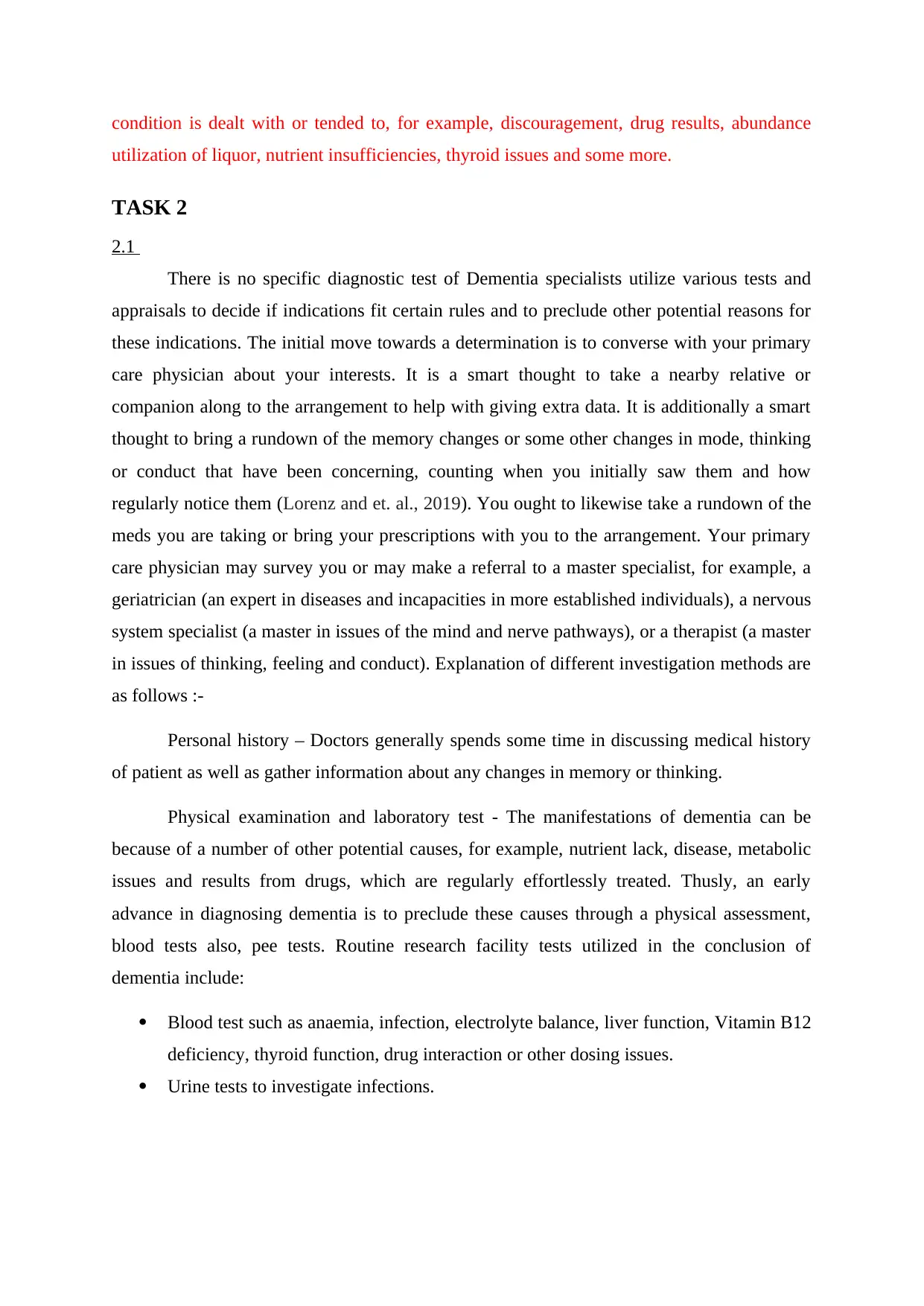
condition is dealt with or tended to, for example, discouragement, drug results, abundance
utilization of liquor, nutrient insufficiencies, thyroid issues and some more.
TASK 2
2.1
There is no specific diagnostic test of Dementia specialists utilize various tests and
appraisals to decide if indications fit certain rules and to preclude other potential reasons for
these indications. The initial move towards a determination is to converse with your primary
care physician about your interests. It is a smart thought to take a nearby relative or
companion along to the arrangement to help with giving extra data. It is additionally a smart
thought to bring a rundown of the memory changes or some other changes in mode, thinking
or conduct that have been concerning, counting when you initially saw them and how
regularly notice them (Lorenz and et. al., 2019). You ought to likewise take a rundown of the
meds you are taking or bring your prescriptions with you to the arrangement. Your primary
care physician may survey you or may make a referral to a master specialist, for example, a
geriatrician (an expert in diseases and incapacities in more established individuals), a nervous
system specialist (a master in issues of the mind and nerve pathways), or a therapist (a master
in issues of thinking, feeling and conduct). Explanation of different investigation methods are
as follows :-
Personal history – Doctors generally spends some time in discussing medical history
of patient as well as gather information about any changes in memory or thinking.
Physical examination and laboratory test - The manifestations of dementia can be
because of a number of other potential causes, for example, nutrient lack, disease, metabolic
issues and results from drugs, which are regularly effortlessly treated. Thusly, an early
advance in diagnosing dementia is to preclude these causes through a physical assessment,
blood tests also, pee tests. Routine research facility tests utilized in the conclusion of
dementia include:
Blood test such as anaemia, infection, electrolyte balance, liver function, Vitamin B12
deficiency, thyroid function, drug interaction or other dosing issues.
Urine tests to investigate infections.
utilization of liquor, nutrient insufficiencies, thyroid issues and some more.
TASK 2
2.1
There is no specific diagnostic test of Dementia specialists utilize various tests and
appraisals to decide if indications fit certain rules and to preclude other potential reasons for
these indications. The initial move towards a determination is to converse with your primary
care physician about your interests. It is a smart thought to take a nearby relative or
companion along to the arrangement to help with giving extra data. It is additionally a smart
thought to bring a rundown of the memory changes or some other changes in mode, thinking
or conduct that have been concerning, counting when you initially saw them and how
regularly notice them (Lorenz and et. al., 2019). You ought to likewise take a rundown of the
meds you are taking or bring your prescriptions with you to the arrangement. Your primary
care physician may survey you or may make a referral to a master specialist, for example, a
geriatrician (an expert in diseases and incapacities in more established individuals), a nervous
system specialist (a master in issues of the mind and nerve pathways), or a therapist (a master
in issues of thinking, feeling and conduct). Explanation of different investigation methods are
as follows :-
Personal history – Doctors generally spends some time in discussing medical history
of patient as well as gather information about any changes in memory or thinking.
Physical examination and laboratory test - The manifestations of dementia can be
because of a number of other potential causes, for example, nutrient lack, disease, metabolic
issues and results from drugs, which are regularly effortlessly treated. Thusly, an early
advance in diagnosing dementia is to preclude these causes through a physical assessment,
blood tests also, pee tests. Routine research facility tests utilized in the conclusion of
dementia include:
Blood test such as anaemia, infection, electrolyte balance, liver function, Vitamin B12
deficiency, thyroid function, drug interaction or other dosing issues.
Urine tests to investigate infections.
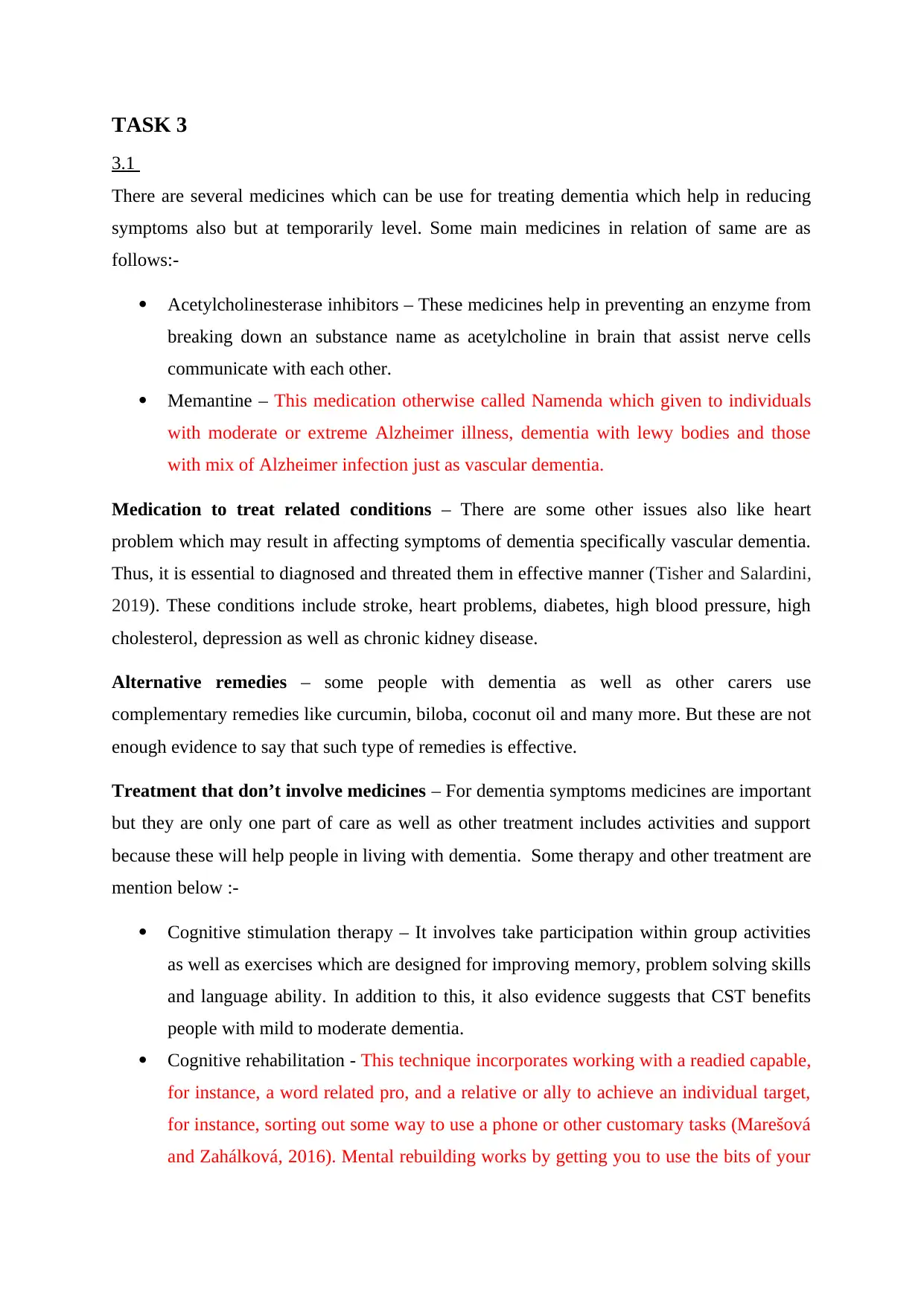
TASK 3
3.1
There are several medicines which can be use for treating dementia which help in reducing
symptoms also but at temporarily level. Some main medicines in relation of same are as
follows:-
Acetylcholinesterase inhibitors – These medicines help in preventing an enzyme from
breaking down an substance name as acetylcholine in brain that assist nerve cells
communicate with each other.
Memantine – This medication otherwise called Namenda which given to individuals
with moderate or extreme Alzheimer illness, dementia with lewy bodies and those
with mix of Alzheimer infection just as vascular dementia.
Medication to treat related conditions – There are some other issues also like heart
problem which may result in affecting symptoms of dementia specifically vascular dementia.
Thus, it is essential to diagnosed and threated them in effective manner (Tisher and Salardini,
2019). These conditions include stroke, heart problems, diabetes, high blood pressure, high
cholesterol, depression as well as chronic kidney disease.
Alternative remedies – some people with dementia as well as other carers use
complementary remedies like curcumin, biloba, coconut oil and many more. But these are not
enough evidence to say that such type of remedies is effective.
Treatment that don’t involve medicines – For dementia symptoms medicines are important
but they are only one part of care as well as other treatment includes activities and support
because these will help people in living with dementia. Some therapy and other treatment are
mention below :-
Cognitive stimulation therapy – It involves take participation within group activities
as well as exercises which are designed for improving memory, problem solving skills
and language ability. In addition to this, it also evidence suggests that CST benefits
people with mild to moderate dementia.
Cognitive rehabilitation - This technique incorporates working with a readied capable,
for instance, a word related pro, and a relative or ally to achieve an individual target,
for instance, sorting out some way to use a phone or other customary tasks (Marešová
and Zahálková, 2016). Mental rebuilding works by getting you to use the bits of your
3.1
There are several medicines which can be use for treating dementia which help in reducing
symptoms also but at temporarily level. Some main medicines in relation of same are as
follows:-
Acetylcholinesterase inhibitors – These medicines help in preventing an enzyme from
breaking down an substance name as acetylcholine in brain that assist nerve cells
communicate with each other.
Memantine – This medication otherwise called Namenda which given to individuals
with moderate or extreme Alzheimer illness, dementia with lewy bodies and those
with mix of Alzheimer infection just as vascular dementia.
Medication to treat related conditions – There are some other issues also like heart
problem which may result in affecting symptoms of dementia specifically vascular dementia.
Thus, it is essential to diagnosed and threated them in effective manner (Tisher and Salardini,
2019). These conditions include stroke, heart problems, diabetes, high blood pressure, high
cholesterol, depression as well as chronic kidney disease.
Alternative remedies – some people with dementia as well as other carers use
complementary remedies like curcumin, biloba, coconut oil and many more. But these are not
enough evidence to say that such type of remedies is effective.
Treatment that don’t involve medicines – For dementia symptoms medicines are important
but they are only one part of care as well as other treatment includes activities and support
because these will help people in living with dementia. Some therapy and other treatment are
mention below :-
Cognitive stimulation therapy – It involves take participation within group activities
as well as exercises which are designed for improving memory, problem solving skills
and language ability. In addition to this, it also evidence suggests that CST benefits
people with mild to moderate dementia.
Cognitive rehabilitation - This technique incorporates working with a readied capable,
for instance, a word related pro, and a relative or ally to achieve an individual target,
for instance, sorting out some way to use a phone or other customary tasks (Marešová
and Zahálková, 2016). Mental rebuilding works by getting you to use the bits of your
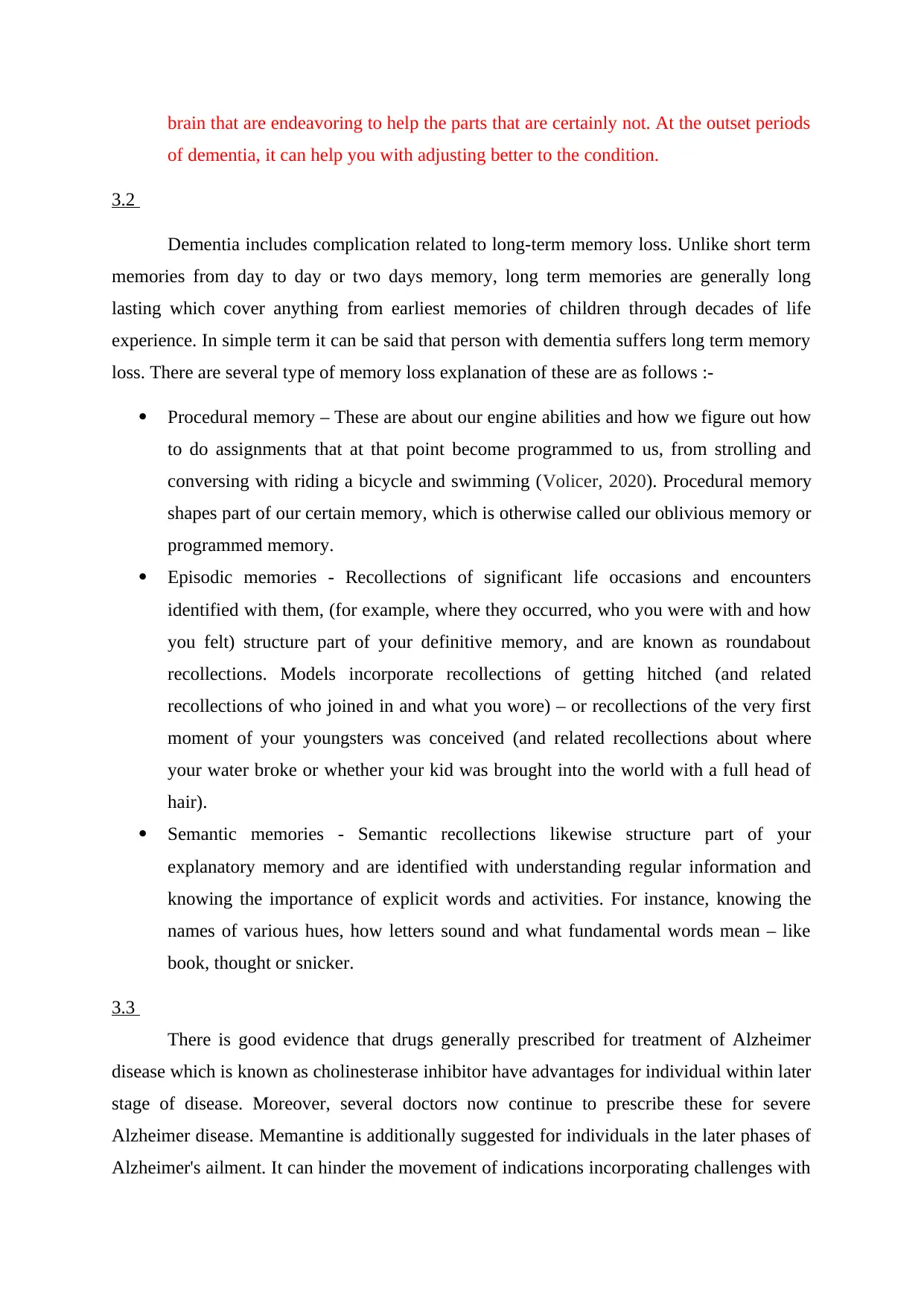
brain that are endeavoring to help the parts that are certainly not. At the outset periods
of dementia, it can help you with adjusting better to the condition.
3.2
Dementia includes complication related to long-term memory loss. Unlike short term
memories from day to day or two days memory, long term memories are generally long
lasting which cover anything from earliest memories of children through decades of life
experience. In simple term it can be said that person with dementia suffers long term memory
loss. There are several type of memory loss explanation of these are as follows :-
Procedural memory – These are about our engine abilities and how we figure out how
to do assignments that at that point become programmed to us, from strolling and
conversing with riding a bicycle and swimming (Volicer, 2020). Procedural memory
shapes part of our certain memory, which is otherwise called our oblivious memory or
programmed memory.
Episodic memories - Recollections of significant life occasions and encounters
identified with them, (for example, where they occurred, who you were with and how
you felt) structure part of your definitive memory, and are known as roundabout
recollections. Models incorporate recollections of getting hitched (and related
recollections of who joined in and what you wore) – or recollections of the very first
moment of your youngsters was conceived (and related recollections about where
your water broke or whether your kid was brought into the world with a full head of
hair).
Semantic memories - Semantic recollections likewise structure part of your
explanatory memory and are identified with understanding regular information and
knowing the importance of explicit words and activities. For instance, knowing the
names of various hues, how letters sound and what fundamental words mean – like
book, thought or snicker.
3.3
There is good evidence that drugs generally prescribed for treatment of Alzheimer
disease which is known as cholinesterase inhibitor have advantages for individual within later
stage of disease. Moreover, several doctors now continue to prescribe these for severe
Alzheimer disease. Memantine is additionally suggested for individuals in the later phases of
Alzheimer's ailment. It can hinder the movement of indications incorporating challenges with
of dementia, it can help you with adjusting better to the condition.
3.2
Dementia includes complication related to long-term memory loss. Unlike short term
memories from day to day or two days memory, long term memories are generally long
lasting which cover anything from earliest memories of children through decades of life
experience. In simple term it can be said that person with dementia suffers long term memory
loss. There are several type of memory loss explanation of these are as follows :-
Procedural memory – These are about our engine abilities and how we figure out how
to do assignments that at that point become programmed to us, from strolling and
conversing with riding a bicycle and swimming (Volicer, 2020). Procedural memory
shapes part of our certain memory, which is otherwise called our oblivious memory or
programmed memory.
Episodic memories - Recollections of significant life occasions and encounters
identified with them, (for example, where they occurred, who you were with and how
you felt) structure part of your definitive memory, and are known as roundabout
recollections. Models incorporate recollections of getting hitched (and related
recollections of who joined in and what you wore) – or recollections of the very first
moment of your youngsters was conceived (and related recollections about where
your water broke or whether your kid was brought into the world with a full head of
hair).
Semantic memories - Semantic recollections likewise structure part of your
explanatory memory and are identified with understanding regular information and
knowing the importance of explicit words and activities. For instance, knowing the
names of various hues, how letters sound and what fundamental words mean – like
book, thought or snicker.
3.3
There is good evidence that drugs generally prescribed for treatment of Alzheimer
disease which is known as cholinesterase inhibitor have advantages for individual within later
stage of disease. Moreover, several doctors now continue to prescribe these for severe
Alzheimer disease. Memantine is additionally suggested for individuals in the later phases of
Alzheimer's ailment. It can hinder the movement of indications incorporating challenges with
Paraphrase This Document
Need a fresh take? Get an instant paraphrase of this document with our AI Paraphraser
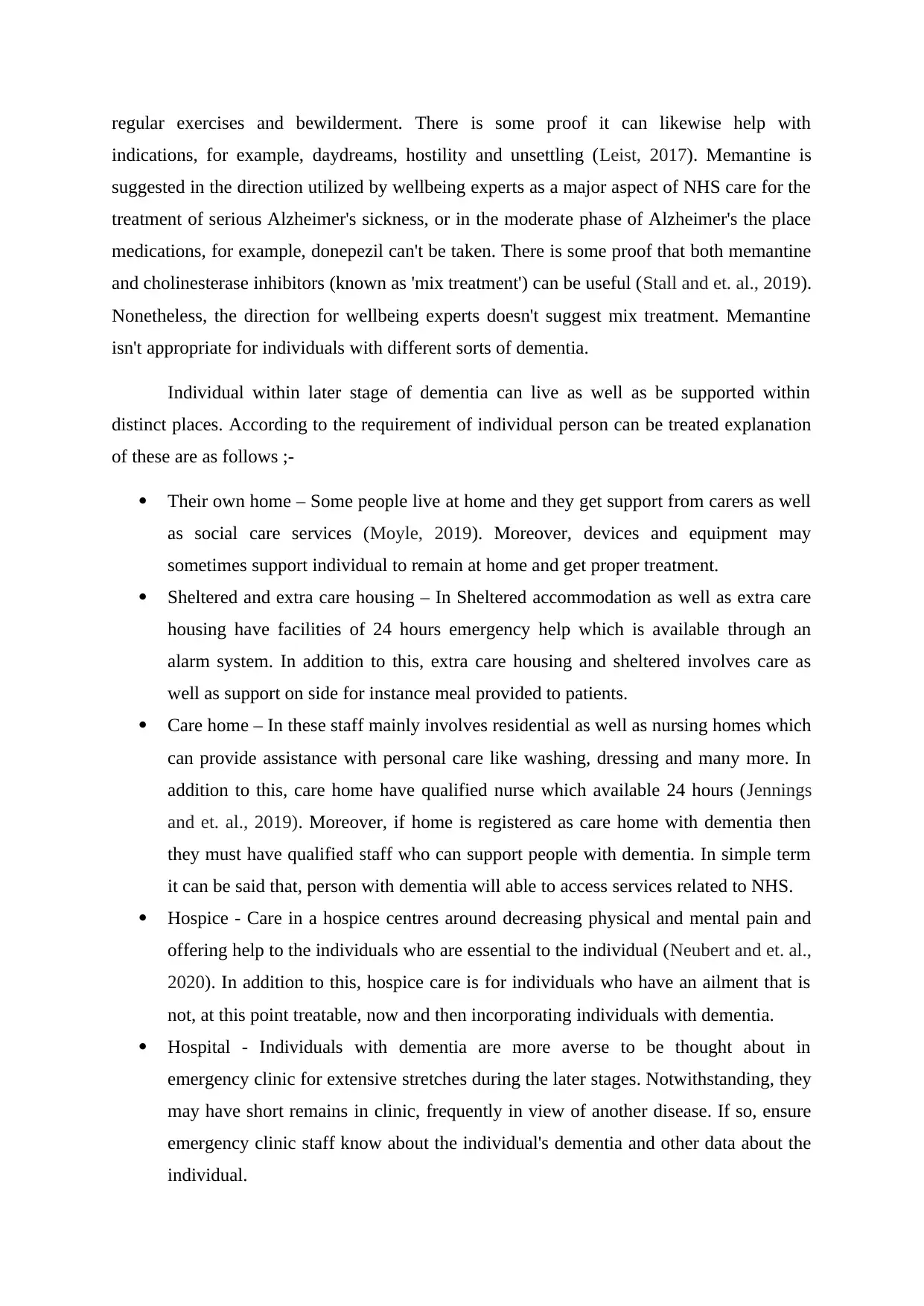
regular exercises and bewilderment. There is some proof it can likewise help with
indications, for example, daydreams, hostility and unsettling (Leist, 2017). Memantine is
suggested in the direction utilized by wellbeing experts as a major aspect of NHS care for the
treatment of serious Alzheimer's sickness, or in the moderate phase of Alzheimer's the place
medications, for example, donepezil can't be taken. There is some proof that both memantine
and cholinesterase inhibitors (known as 'mix treatment') can be useful (Stall and et. al., 2019).
Nonetheless, the direction for wellbeing experts doesn't suggest mix treatment. Memantine
isn't appropriate for individuals with different sorts of dementia.
Individual within later stage of dementia can live as well as be supported within
distinct places. According to the requirement of individual person can be treated explanation
of these are as follows ;-
Their own home – Some people live at home and they get support from carers as well
as social care services (Moyle, 2019). Moreover, devices and equipment may
sometimes support individual to remain at home and get proper treatment.
Sheltered and extra care housing – In Sheltered accommodation as well as extra care
housing have facilities of 24 hours emergency help which is available through an
alarm system. In addition to this, extra care housing and sheltered involves care as
well as support on side for instance meal provided to patients.
Care home – In these staff mainly involves residential as well as nursing homes which
can provide assistance with personal care like washing, dressing and many more. In
addition to this, care home have qualified nurse which available 24 hours (Jennings
and et. al., 2019). Moreover, if home is registered as care home with dementia then
they must have qualified staff who can support people with dementia. In simple term
it can be said that, person with dementia will able to access services related to NHS.
Hospice - Care in a hospice centres around decreasing physical and mental pain and
offering help to the individuals who are essential to the individual (Neubert and et. al.,
2020). In addition to this, hospice care is for individuals who have an ailment that is
not, at this point treatable, now and then incorporating individuals with dementia.
Hospital - Individuals with dementia are more averse to be thought about in
emergency clinic for extensive stretches during the later stages. Notwithstanding, they
may have short remains in clinic, frequently in view of another disease. If so, ensure
emergency clinic staff know about the individual's dementia and other data about the
individual.
indications, for example, daydreams, hostility and unsettling (Leist, 2017). Memantine is
suggested in the direction utilized by wellbeing experts as a major aspect of NHS care for the
treatment of serious Alzheimer's sickness, or in the moderate phase of Alzheimer's the place
medications, for example, donepezil can't be taken. There is some proof that both memantine
and cholinesterase inhibitors (known as 'mix treatment') can be useful (Stall and et. al., 2019).
Nonetheless, the direction for wellbeing experts doesn't suggest mix treatment. Memantine
isn't appropriate for individuals with different sorts of dementia.
Individual within later stage of dementia can live as well as be supported within
distinct places. According to the requirement of individual person can be treated explanation
of these are as follows ;-
Their own home – Some people live at home and they get support from carers as well
as social care services (Moyle, 2019). Moreover, devices and equipment may
sometimes support individual to remain at home and get proper treatment.
Sheltered and extra care housing – In Sheltered accommodation as well as extra care
housing have facilities of 24 hours emergency help which is available through an
alarm system. In addition to this, extra care housing and sheltered involves care as
well as support on side for instance meal provided to patients.
Care home – In these staff mainly involves residential as well as nursing homes which
can provide assistance with personal care like washing, dressing and many more. In
addition to this, care home have qualified nurse which available 24 hours (Jennings
and et. al., 2019). Moreover, if home is registered as care home with dementia then
they must have qualified staff who can support people with dementia. In simple term
it can be said that, person with dementia will able to access services related to NHS.
Hospice - Care in a hospice centres around decreasing physical and mental pain and
offering help to the individuals who are essential to the individual (Neubert and et. al.,
2020). In addition to this, hospice care is for individuals who have an ailment that is
not, at this point treatable, now and then incorporating individuals with dementia.
Hospital - Individuals with dementia are more averse to be thought about in
emergency clinic for extensive stretches during the later stages. Notwithstanding, they
may have short remains in clinic, frequently in view of another disease. If so, ensure
emergency clinic staff know about the individual's dementia and other data about the
individual.
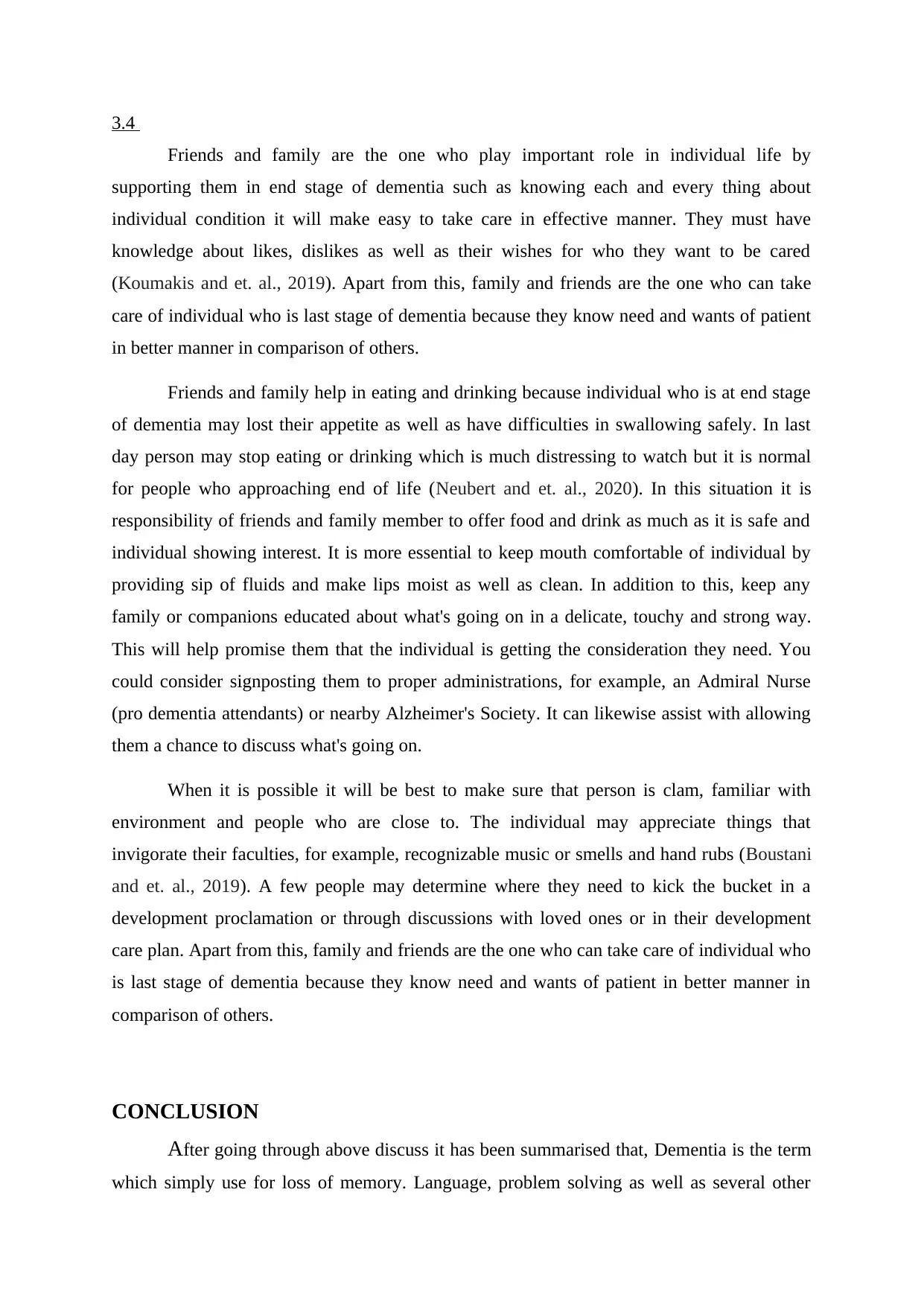
3.4
Friends and family are the one who play important role in individual life by
supporting them in end stage of dementia such as knowing each and every thing about
individual condition it will make easy to take care in effective manner. They must have
knowledge about likes, dislikes as well as their wishes for who they want to be cared
(Koumakis and et. al., 2019). Apart from this, family and friends are the one who can take
care of individual who is last stage of dementia because they know need and wants of patient
in better manner in comparison of others.
Friends and family help in eating and drinking because individual who is at end stage
of dementia may lost their appetite as well as have difficulties in swallowing safely. In last
day person may stop eating or drinking which is much distressing to watch but it is normal
for people who approaching end of life (Neubert and et. al., 2020). In this situation it is
responsibility of friends and family member to offer food and drink as much as it is safe and
individual showing interest. It is more essential to keep mouth comfortable of individual by
providing sip of fluids and make lips moist as well as clean. In addition to this, keep any
family or companions educated about what's going on in a delicate, touchy and strong way.
This will help promise them that the individual is getting the consideration they need. You
could consider signposting them to proper administrations, for example, an Admiral Nurse
(pro dementia attendants) or nearby Alzheimer's Society. It can likewise assist with allowing
them a chance to discuss what's going on.
When it is possible it will be best to make sure that person is clam, familiar with
environment and people who are close to. The individual may appreciate things that
invigorate their faculties, for example, recognizable music or smells and hand rubs (Boustani
and et. al., 2019). A few people may determine where they need to kick the bucket in a
development proclamation or through discussions with loved ones or in their development
care plan. Apart from this, family and friends are the one who can take care of individual who
is last stage of dementia because they know need and wants of patient in better manner in
comparison of others.
CONCLUSION
After going through above discuss it has been summarised that, Dementia is the term
which simply use for loss of memory. Language, problem solving as well as several other
Friends and family are the one who play important role in individual life by
supporting them in end stage of dementia such as knowing each and every thing about
individual condition it will make easy to take care in effective manner. They must have
knowledge about likes, dislikes as well as their wishes for who they want to be cared
(Koumakis and et. al., 2019). Apart from this, family and friends are the one who can take
care of individual who is last stage of dementia because they know need and wants of patient
in better manner in comparison of others.
Friends and family help in eating and drinking because individual who is at end stage
of dementia may lost their appetite as well as have difficulties in swallowing safely. In last
day person may stop eating or drinking which is much distressing to watch but it is normal
for people who approaching end of life (Neubert and et. al., 2020). In this situation it is
responsibility of friends and family member to offer food and drink as much as it is safe and
individual showing interest. It is more essential to keep mouth comfortable of individual by
providing sip of fluids and make lips moist as well as clean. In addition to this, keep any
family or companions educated about what's going on in a delicate, touchy and strong way.
This will help promise them that the individual is getting the consideration they need. You
could consider signposting them to proper administrations, for example, an Admiral Nurse
(pro dementia attendants) or nearby Alzheimer's Society. It can likewise assist with allowing
them a chance to discuss what's going on.
When it is possible it will be best to make sure that person is clam, familiar with
environment and people who are close to. The individual may appreciate things that
invigorate their faculties, for example, recognizable music or smells and hand rubs (Boustani
and et. al., 2019). A few people may determine where they need to kick the bucket in a
development proclamation or through discussions with loved ones or in their development
care plan. Apart from this, family and friends are the one who can take care of individual who
is last stage of dementia because they know need and wants of patient in better manner in
comparison of others.
CONCLUSION
After going through above discuss it has been summarised that, Dementia is the term
which simply use for loss of memory. Language, problem solving as well as several other

thinking abilities which is severe enough for interfere within daily life. In addition to this,
Alzheimer’s is one of the common causes of dementia. In addition to this, there are some
common cause of dementia such as problem with short-term memory, paying bills,
remembering appointments and many more. Moreover. Major cause behind dementia is
damage to brain cells as well as brain cells will not communicate normally, thinking,
behaviour and feelings can be affected. Along with this, It is important to provide proper
treatment to individual suffering from dementia so he/she can get recover in easy manner.
Alzheimer’s is one of the common causes of dementia. In addition to this, there are some
common cause of dementia such as problem with short-term memory, paying bills,
remembering appointments and many more. Moreover. Major cause behind dementia is
damage to brain cells as well as brain cells will not communicate normally, thinking,
behaviour and feelings can be affected. Along with this, It is important to provide proper
treatment to individual suffering from dementia so he/she can get recover in easy manner.
Secure Best Marks with AI Grader
Need help grading? Try our AI Grader for instant feedback on your assignments.
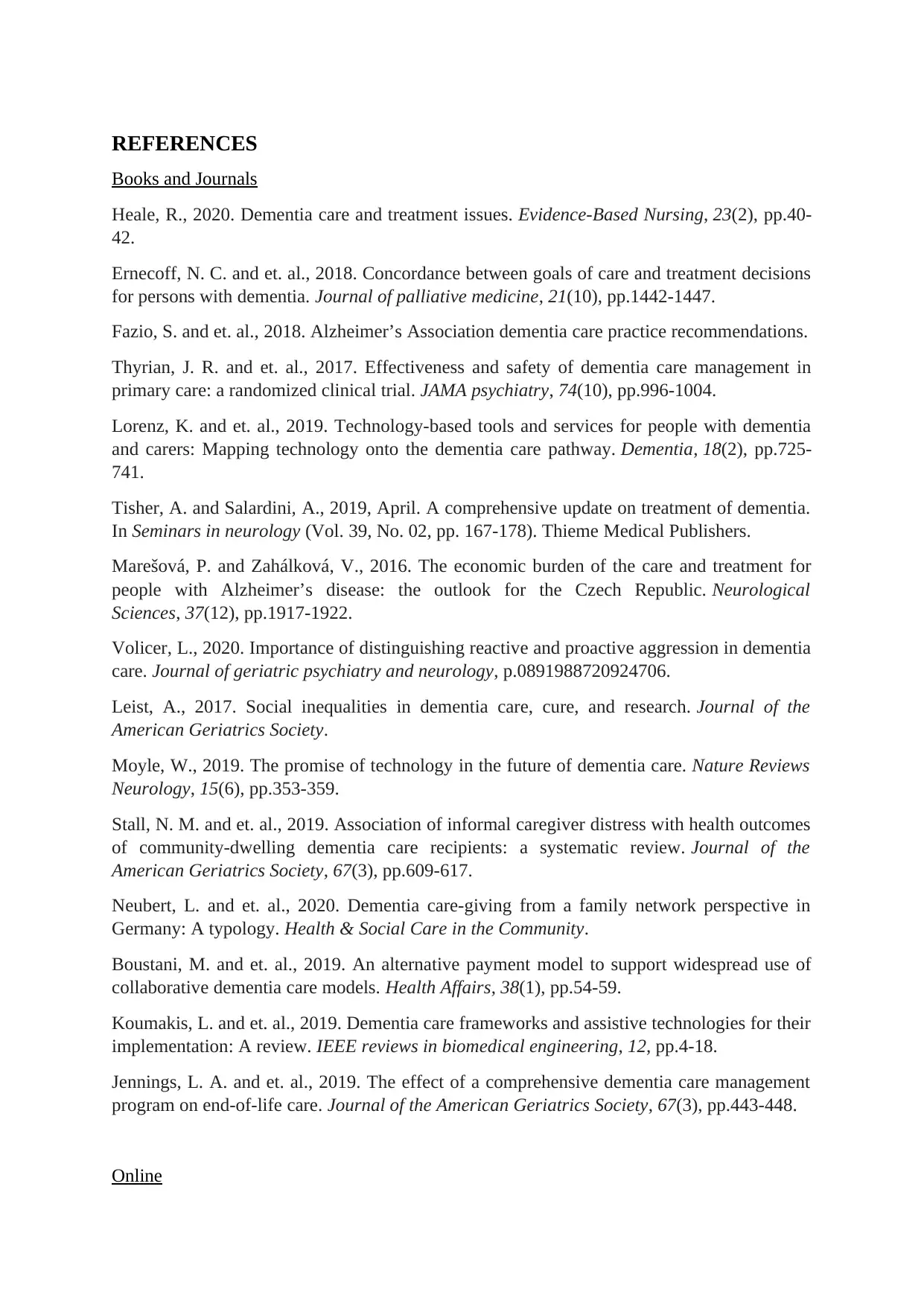
REFERENCES
Books and Journals
Heale, R., 2020. Dementia care and treatment issues. Evidence-Based Nursing, 23(2), pp.40-
42.
Ernecoff, N. C. and et. al., 2018. Concordance between goals of care and treatment decisions
for persons with dementia. Journal of palliative medicine, 21(10), pp.1442-1447.
Fazio, S. and et. al., 2018. Alzheimer’s Association dementia care practice recommendations.
Thyrian, J. R. and et. al., 2017. Effectiveness and safety of dementia care management in
primary care: a randomized clinical trial. JAMA psychiatry, 74(10), pp.996-1004.
Lorenz, K. and et. al., 2019. Technology-based tools and services for people with dementia
and carers: Mapping technology onto the dementia care pathway. Dementia, 18(2), pp.725-
741.
Tisher, A. and Salardini, A., 2019, April. A comprehensive update on treatment of dementia.
In Seminars in neurology (Vol. 39, No. 02, pp. 167-178). Thieme Medical Publishers.
Marešová, P. and Zahálková, V., 2016. The economic burden of the care and treatment for
people with Alzheimer’s disease: the outlook for the Czech Republic. Neurological
Sciences, 37(12), pp.1917-1922.
Volicer, L., 2020. Importance of distinguishing reactive and proactive aggression in dementia
care. Journal of geriatric psychiatry and neurology, p.0891988720924706.
Leist, A., 2017. Social inequalities in dementia care, cure, and research. Journal of the
American Geriatrics Society.
Moyle, W., 2019. The promise of technology in the future of dementia care. Nature Reviews
Neurology, 15(6), pp.353-359.
Stall, N. M. and et. al., 2019. Association of informal caregiver distress with health outcomes
of community‐dwelling dementia care recipients: a systematic review. Journal of the
American Geriatrics Society, 67(3), pp.609-617.
Neubert, L. and et. al., 2020. Dementia care‐giving from a family network perspective in
Germany: A typology. Health & Social Care in the Community.
Boustani, M. and et. al., 2019. An alternative payment model to support widespread use of
collaborative dementia care models. Health Affairs, 38(1), pp.54-59.
Koumakis, L. and et. al., 2019. Dementia care frameworks and assistive technologies for their
implementation: A review. IEEE reviews in biomedical engineering, 12, pp.4-18.
Jennings, L. A. and et. al., 2019. The effect of a comprehensive dementia care management
program on end‐of‐life care. Journal of the American Geriatrics Society, 67(3), pp.443-448.
Online
Books and Journals
Heale, R., 2020. Dementia care and treatment issues. Evidence-Based Nursing, 23(2), pp.40-
42.
Ernecoff, N. C. and et. al., 2018. Concordance between goals of care and treatment decisions
for persons with dementia. Journal of palliative medicine, 21(10), pp.1442-1447.
Fazio, S. and et. al., 2018. Alzheimer’s Association dementia care practice recommendations.
Thyrian, J. R. and et. al., 2017. Effectiveness and safety of dementia care management in
primary care: a randomized clinical trial. JAMA psychiatry, 74(10), pp.996-1004.
Lorenz, K. and et. al., 2019. Technology-based tools and services for people with dementia
and carers: Mapping technology onto the dementia care pathway. Dementia, 18(2), pp.725-
741.
Tisher, A. and Salardini, A., 2019, April. A comprehensive update on treatment of dementia.
In Seminars in neurology (Vol. 39, No. 02, pp. 167-178). Thieme Medical Publishers.
Marešová, P. and Zahálková, V., 2016. The economic burden of the care and treatment for
people with Alzheimer’s disease: the outlook for the Czech Republic. Neurological
Sciences, 37(12), pp.1917-1922.
Volicer, L., 2020. Importance of distinguishing reactive and proactive aggression in dementia
care. Journal of geriatric psychiatry and neurology, p.0891988720924706.
Leist, A., 2017. Social inequalities in dementia care, cure, and research. Journal of the
American Geriatrics Society.
Moyle, W., 2019. The promise of technology in the future of dementia care. Nature Reviews
Neurology, 15(6), pp.353-359.
Stall, N. M. and et. al., 2019. Association of informal caregiver distress with health outcomes
of community‐dwelling dementia care recipients: a systematic review. Journal of the
American Geriatrics Society, 67(3), pp.609-617.
Neubert, L. and et. al., 2020. Dementia care‐giving from a family network perspective in
Germany: A typology. Health & Social Care in the Community.
Boustani, M. and et. al., 2019. An alternative payment model to support widespread use of
collaborative dementia care models. Health Affairs, 38(1), pp.54-59.
Koumakis, L. and et. al., 2019. Dementia care frameworks and assistive technologies for their
implementation: A review. IEEE reviews in biomedical engineering, 12, pp.4-18.
Jennings, L. A. and et. al., 2019. The effect of a comprehensive dementia care management
program on end‐of‐life care. Journal of the American Geriatrics Society, 67(3), pp.443-448.
Online

About dementia, 2020.[Online].Available through<
https://www.nhs.uk/conditions/dementia/about/ >
https://www.nhs.uk/conditions/dementia/about/ >
1 out of 12
Your All-in-One AI-Powered Toolkit for Academic Success.
+13062052269
info@desklib.com
Available 24*7 on WhatsApp / Email
![[object Object]](/_next/static/media/star-bottom.7253800d.svg)
Unlock your academic potential
© 2024 | Zucol Services PVT LTD | All rights reserved.





